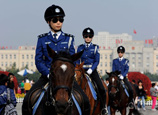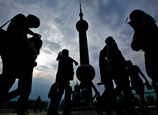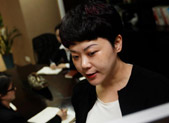
BEIJING, May 28 (Xinhua) -- Speculative money lies behind the rising yuan as the relatively high interest rates in China in comparison to other countries are attractive to investors.
The Chinese currency Renminbi, or the yuan, retreated 7 basis points to 6.1818 against the U.S. dollar on Tuesday, after having gained 56 basis points to set a record high of 6.1811 on Monday, according to the China Foreign Exchange Trading System.
So far this year, the central parity of the yuan against the U.S. dollar has expanded by about 1.7 percent.
Chen Daofu, a researcher with the Development Research Center of the State Council, said the yuan's appreciation has recently been pushed up by the wave of interest rate cuts on the global markets, the plummeting yen and expectations on the yuan to appreciate.
Central banks in the eurozone, India, Australia, the Republic of Korea, Poland and Israel cut rates in early May, amid lower-than-expected global growth and the yen's drastic depreciation, which fueled competitive devaluation concerns.
The Chinese central bank has not followed suit yet.
Li Huiyong, an analyst with Shenyin & Wanguo Securities, said there seems to be quite a good chance that China will cut interest rates, but such a move, if taken, may hike prices including in property.
But without such a move, interest rate differentials would grow bigger between China, with its intact interest rates, and other major economies with newly cut interest rates, attracting more speculative capital into China and putting the yuan under further appreciation pressure, according to Li.
The analyst said an overall way-out for monetary controls should be to further free interest rates and foreign exchange rates.
The central bank vowed to steadily push forward market-oriented reform in its interest rates and exchange rates mechanisms in 2013, according to a statement issued on May 24.
Suspecting that arbitrage funds have entered China in the guise of trade payments, the State Administration of Foreign Exchange, China's top forex regulator, said on May 6 that it will strengthen oversight on the operations of traders and commercial banks to fend off risks brought by illegal cross-border capital movement.
The rising yuan has posed risks for traditional sectors.
Li Youhuan, a professor at the Guangdong Academy of Social Sciences, said traditional exports, like shoes, clothes and furniture, are creaking under the soaring yuan as it cut their price advantages, but high-tech industries are more resilient under such pressures.
















 White angels in Chongqing South West Hospital
White angels in Chongqing South West Hospital


![]()
